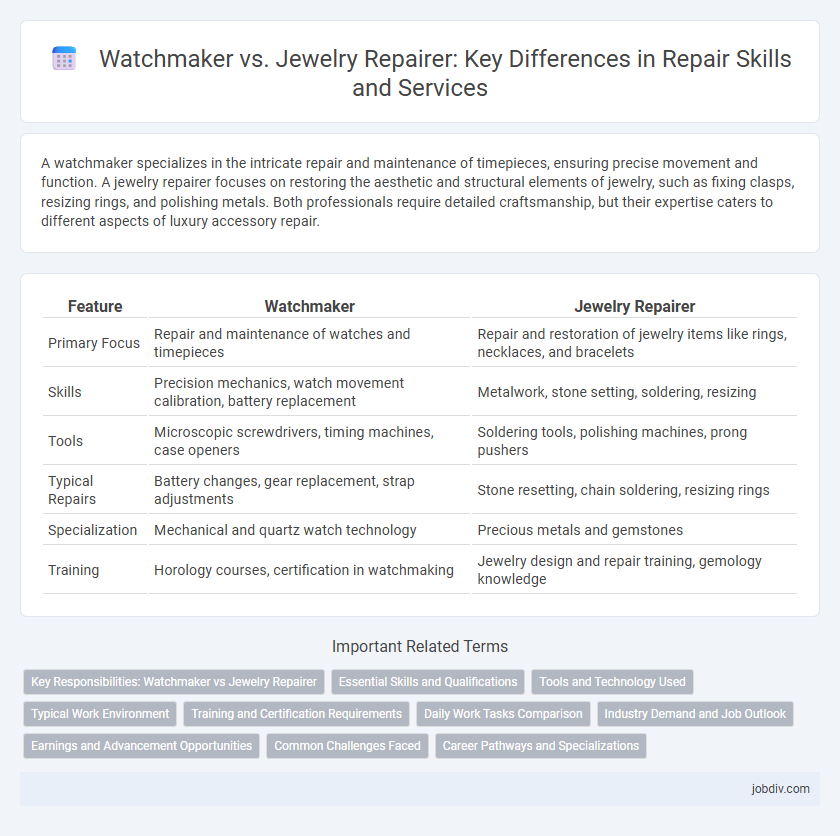A watchmaker specializes in the intricate repair and maintenance of timepieces, ensuring precise movement and function. A jewelry repairer focuses on restoring the aesthetic and structural elements of jewelry, such as fixing clasps, resizing rings, and polishing metals. Both professionals require detailed craftsmanship, but their expertise caters to different aspects of luxury accessory repair.
Table of Comparison
| Feature | Watchmaker | Jewelry Repairer |
|---|---|---|
| Primary Focus | Repair and maintenance of watches and timepieces | Repair and restoration of jewelry items like rings, necklaces, and bracelets |
| Skills | Precision mechanics, watch movement calibration, battery replacement | Metalwork, stone setting, soldering, resizing |
| Tools | Microscopic screwdrivers, timing machines, case openers | Soldering tools, polishing machines, prong pushers |
| Typical Repairs | Battery changes, gear replacement, strap adjustments | Stone resetting, chain soldering, resizing rings |
| Specialization | Mechanical and quartz watch technology | Precious metals and gemstones |
| Training | Horology courses, certification in watchmaking | Jewelry design and repair training, gemology knowledge |
Key Responsibilities: Watchmaker vs Jewelry Repairer
Watchmakers specialize in the intricate repair and maintenance of timepieces, including the calibration of mechanical movements, replacement of watch batteries, and restoration of watch cases. Jewelry repairers focus on tasks such as resizing rings, soldering broken chains, replacing gemstones, and polishing various types of jewelry for aesthetic enhancement. Both professionals require precision skills, but watchmakers emphasize horological mechanisms while jewelry repairers concentrate on metalwork and gem setting.
Essential Skills and Qualifications
Watchmakers require precision skills in mechanical movement repair, knowledge of horology, and the ability to work with tiny components under magnification. Jewelry repairers must master expertise in metalworking, stone setting, polishing, and soldering techniques to restore and maintain various types of jewelry. Both professions demand steady hands, attention to detail, and experience with specialized tools unique to their respective crafts.
Tools and Technology Used
Watchmakers utilize precision tools such as loupe magnifiers, timing machines, and specialized screwdrivers designed for intricate watch movements, emphasizing micromechanical expertise. Jewelry repairers employ equipment like soldering torches, polishing machines, and ultrasonic cleaners to restore gemstones and metal alloys, optimizing aesthetic and structural integrity. Advanced technology like laser soldering and CAD design software is increasingly incorporated by both professionals to enhance accuracy and repair quality.
Typical Work Environment
Watchmakers typically work in specialized workshops equipped with precision instruments and magnifying tools to handle intricate timepieces, often requiring a dust-free, well-lit environment. Jewelry repairers operate in similar settings but may also work in retail stores, focusing on a broader range of materials including precious metals and gemstones. Both professions demand steady hands and attention to detail, but watchmaking environments are more tailored to mechanical and electronic timepiece components.
Training and Certification Requirements
Watchmakers typically undergo specialized training in horology, often completing formal apprenticeships or certification programs from recognized institutions such as the American Watchmakers-Clockmakers Institute (AWCI). Jewelry repairers usually receive broader training in metalworking, gemology, and soldering, with certifications from organizations like the Gemological Institute of America (GIA) or specialized trade schools. Both professions require hands-on skill development, but watchmakers emphasize mechanical precision and timing calibration, while jewelry repairers focus on aesthetics and structural restoration.
Daily Work Tasks Comparison
Watchmakers specialize in precision tasks like repairing watch movements, adjusting escapements, and calibrating timekeeping mechanisms, requiring expertise in micro-mechanics and horology. Jewelry repairers focus on tasks such as soldering broken chains, resizing rings, and polishing gemstones, emphasizing metalwork and aesthetics for various types of jewelry. Both professions demand fine motor skills and attention to detail but differ significantly in tools and techniques used during their daily work.
Industry Demand and Job Outlook
Watchmakers face steady industry demand driven by the luxury watch market's growth and increasing consumer interest in mechanical timepieces. Jewelry repairers experience a consistent job outlook fueled by the expanding jewelry industry and rising demand for custom and restoration services. Both professions require specialized skills, but watchmakers often encounter higher demand in niche markets, while jewelry repairers benefit from broader retail and personal service sectors.
Earnings and Advancement Opportunities
Watchmakers typically earn higher salaries due to specialized skills in mechanical and electronic timepieces, with median annual earnings around $45,000 to $60,000. Jewelry repairers, while earning slightly less with average incomes between $35,000 and $50,000, often find steady work in retail environments with opportunities for skill diversification. Career advancement for watchmakers often includes mastering complex repairs and certifications such as WOSTEP, whereas jewelry repairers may progress to roles like master jeweler or store manager.
Common Challenges Faced
Watchmakers and jewelry repairers commonly face challenges such as restoring intricate mechanisms and delicate settings without causing further damage. Precision tools and steady hands are essential to address wear and tear, corrosion, and tiny component replacements. Both professions require deep knowledge of materials and craftsmanship to maintain original aesthetics and functionality.
Career Pathways and Specializations
Watchmakers specialize in repairing and assembling intricate timepieces, requiring expertise in micro-mechanics, precision tools, and horology, often working with brands ranging from luxury to vintage watches. Jewelry repairers focus on restoring and maintaining various types of jewelry, including resizing rings, fixing clasps, and polishing metals, relying heavily on skills in metalworking, gem setting, and design restoration. Career pathways diverge as watchmakers typically train through specialized horology schools and certifications, while jewelry repairers often gain experience via apprenticeships or gemology courses, each offering distinct advancement opportunities within their respective industries.
Watchmaker vs Jewelry Repairer Infographic

 jobdiv.com
jobdiv.com